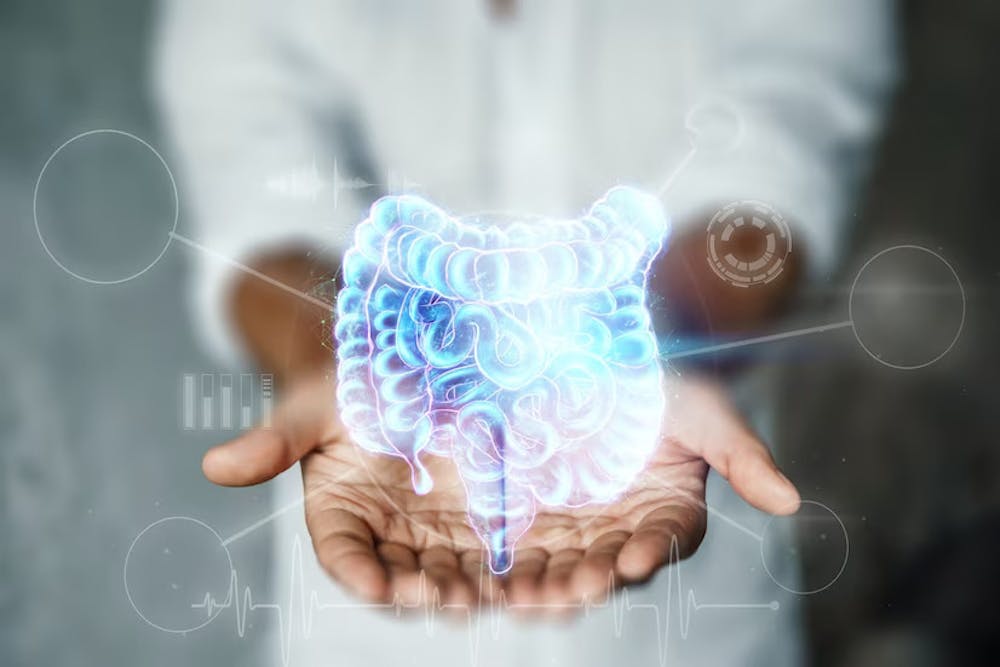Have you ever had the uneasy feeling that something is wrong with your body but you are unsure what it is? Perhaps you're dealing with symptoms like fatigue, weight gain, or mood changes that, despite your best efforts, just don't seem to go away.
Your hormone balance and intestinal health may hold the key to solving these issues. We all know that our gut and hormone plays a major role in keeping us healthy and active. But is there any strong connection between gut health and hormone imbalance? Yes, you read that right.

Recent studies have revealed a significant link between the two, and being aware of this link can help you improve your health and feel your best. Hormone production and regulation are significantly influenced by the gut microbiome.
In fact, changes in the gut microbiome can influence hormones like thyroid, estrogen, and testosterone. A hormone imbalance can cause a wide range of symptoms, including mood swings, acne, and weight gain. Unfortunately, a lot of people who have these symptoms don't understand how their hormone balances and gut health are related.
The best gut health treatment India focuses on improving your gut health through a healthy diet and lifestyle changes. A healthy gut can help manage your hormonal balance and boost immunity in the body. So, let's get started and uncover the secrets to a healthy gut and balanced hormones.
Recommended: The Connection Between Gut Health and Skin Health
What Is The Connection Between Hormone Imbalance And Gut Health?
The human body is a multi-organ system in which numerous systems work together to keep things in balance. The relationship between gut health and hormones is one such connection. Trillions of bacteria that are essential for the digestion of food, and the immune system lives inside your gut. While hormones are chemical messengers that are produced by various glands in our body. These hormones regulate many bodily functions, such as appetite, metabolism, sleep, and mood. An imbalance in hormone production and metabolism can result from a disruption in gut health.
A leaky gut can cause inflammation, which then opens the door for half-digested food to enter the bloodstream and disrupt the hormones of the gut. Similarly, stress can affect hormone production and balance, which is a main cause of digestive disorders. But don’t worry there are options available to control these conditions. You can join a trusted Hormonal Imbalance Treatment In India to maintain your gut health. Moreover, eating a plant-based diet, regular exercise, and stress reduction can also help in healing gut health.

Must Read: Understanding The Gut-Brain Connection - Reverse Factor
Symptoms Of An Unhealthy Gut
The main cause of an unhealthy gut includes a poor diet that lacks fiber and nutrients, high sugar and processed foods can harm the gut microbiome. Another significant contributor to gut problems is chronic stress. It can promote inflammation and have negative effects on the gut-brain axis. Here are some common symptoms of an unhealthy gut that you should never ignore –
- Bloating / Gas
- Constipation
- Diarrhea
- Acid Reflux
- Food intolerances and sensitivities
- Inflammatory bowel disease
- Chronic fatigue
- Acne / Eczema
- Brain Fog
- Depression
- Autoimmune conditions
- Nutrient deficiencies
- Sleep disturbances and Insomnia
- Hormonal Imbalances
- Leaky Gut Syndrome
- Obesity
Read More: The Link Between Hormonal Imbalances and Mental Health
Connection Between Stress And Gut Health
Cortisol and adrenaline are two hormones that are released by the body in response to stress and can harm your gut health and digestion. When we are under stress, our digestive muscles can contract, which can result in cramps, bloating, and constipation. Moreover, it can reduce blood flow to the digestive tract, which may result in gut inflammation. Chronic stress can also upset the balance of gut bacteria. It causes dysbiosis and a higher risk of digestive problems including Irritable Bowel Syndrome (IBS).
Hormones Affected by Gut Health
It is important to understand gut hormones and their functions. And how an imbalance in your gut and hormone levels can affect your overall health.
1. Estrogen
The hormone estrogen is essential for the growth and control of the female reproductive system. It is mainly produced in the ovaries, while it is also synthesized in lower amounts by other organs such as the adrenal glands and fat cells. The body uses estrogen for regulating the menstrual cycle and promoting the growth of reproductive tissues. Thus, a slight imbalance in this hormone can affect gut health and PCOS, a hormonal disorder.
Estrogen dominance can result in a variety of symptoms, such as mood fluctuations, weight gain, or heavy or irregular periods. On the other hand, low estrogen levels can result in symptoms including hot flashes, dry vaginal skin, and mood swings.
2. Testosterone
Testosterone is a hormone that is primarily produced in the testes of males and smaller amounts in the ovaries of females. Although it is mostly linked to masculine traits like body hair, muscle mass, and a deep voice. It also has a crucial impact on both sexes' general health and happiness. It regulates several functions including bone density, red blood cell production, and sex drive. The growth of male reproductive tissues like the testes and prostate gland depends on it as well. Moreover, testosterone also helps women maintain their bone and muscle mass.
An imbalance in gut bacteria, known as dysbiosis, has been linked to low levels of testosterone in men. Dysbiosis can cause the body to become more inflamed, which can disrupt hormone production and signaling.
3. Thyroid Hormones
The thyroid gland is a tiny gland in a shape of a butterfly that is situated in the neck. It produces a group of hormones known as thyroid hormones. An inadequate or overactive thyroid can cause a variety of symptoms, such as weight gain or loss, exhaustion, and mood changes. You might wonder what is the link between gut health and thyroid or hormonal imbalance.
Studies have found that gut bacteria can influence the absorption and use of iodine. Iodine is a key nutrient required for the production of thyroid hormones. Dysbiosis can cause decreased iodine absorption and T4 to T3 conversion. It can result in low thyroid hormone levels and many related symptoms.
How To Improve Gut Health For Hormone Imbalance Naturally?
There are plenty of ways that help balance hormones and keep your gut healthy. Let’s explore some simple ways to balance your hormones naturally.
Consume A Plant-Based Diet
A plant-based diet provides several health advantages. It can boost your gut health and also regulate hormone levels. The group of microbes that lives in your intestines is essential for your health and wellness. Fruits, vegetables, whole grains, nuts, and seeds are the best foods to eat for a healthy gut. These foods are high in fiber, which supports the development of good gut bacteria.
Foods To Support Gut Health
Apples
The fiber in apples helps to support healthy digestion and the development of good bacteria in the gut. This is why apples are considered one of the best healthy bacteria foods. They also contain antioxidants and phytonutrients that help to reduce inflammation.
Bananas
Bananas also contain prebiotics, which feed the good bacteria in the gut. It promotes healthy digestion and nutrient absorption.
Pears
Pears are an excellent source of fiber and contain antioxidants that help reduce inflammation in the intestines. It also contains sorbitol, a natural laxative. Sorbitol relieves constipation and promotes regular bowel movements.
Leafy greens
Leafy greens like spinach are rich in fiber, vitamins, and minerals that support gut health and promote healthy digestion. Moreover, they have antioxidants that support better hormonal balance and reduce inflammation.
Carrots
Besides being a healthy source of fiber, carrots also provide antioxidants. It helps reduce gastrointestinal inflammation. Carrots also contain beta-carotene, which supports healthy hormone levels.
Foods To Avoid For Gut Health
Processed and junk foods
Processed and junk foods are high in unhealthy fats and refined sugars. All these can upset the gut's bacterial balance and cause inflammation in the gut lining.
High-fat animal products
Consuming too much red meat and high-fat dairy products causes inflammation in the gut and disrupts hormone balance. It is best to avoid these food items and consume a plant-based diet.
Alcohol
Alcohol consumption can damage the stomach lining. It causes inflammation, which can interfere with hormone regulation.
Fried and greasy foods
Foods that are fried or cooked in oils rich in saturated or trans fats might be harmful to hormone balance in the body.
Lifestyle Changes For Gut Health And Hormone Balance
Manage Stress Through Regular Exercise
Stress is a common experience that has an impact on our everyday life, and unfortunately, it can harm the balance of our hormones and gut bacteria. But one of the most important aspects of improving these conditions is stress management. Regular exercise and physical activity are two of the best strategies to reduce stress. Exercise releases endorphins, which are feel-good chemicals. It helps reduce stress and improve our mood. You can also practice deep breathing, meditation, or yoga to reduce stress. These methods help in reducing stress responses in the body and calm the mind.
Prioritize Your Sleep Schedule
Sleep should be your main priority if you want to improve the balance of your hormones and gut bacteria. Getting enough quality sleep is essential for the body to repair and restore itself, including the gut and hormonal systems. To make sleep a priority, start by creating a regular sleep schedule that includes going to bed and waking up at the same time each day. This helps your body to regulate its internal clock, making it easier to fall asleep and wake up naturally.
Keep your bedroom cold, dark, and quiet to promote restful sleep. Avoid using electronic gadgets right before bed as their blue light can affect how well you sleep. Also, try to avoid drinking caffeine, alcohol or consuming heavy meals before going to bed. All these can harm your hormone balance and intestinal health.
Final Thoughts
The production, metabolism, and regulation of hormones are highly dependent on our gut health. Thus, taking care of your gut health is crucial to prevent hormonal imbalances. It can cause a variety of health problems, from chronic diseases to mood swings.
You can support your gut bacteria and encourage hormonal balance by consuming a high-fiber diet. You can improve your health and lead the healthiest life possible by adopting a holistic approach to wellness.
Frequently Asked Questions –
1. Can Gut Issues Cause Hormonal Imbalance?
Yes, digestive problems can lead to various hormone problems. It can affect the hormones such as estrogen, testosterone, and thyroid hormones.
2. Can Healing Gut Balance Hormones?
Yes, It is possible to improve hormone regulation by restoring a healthy balance of gut bacteria.
3. What Are The Signs Of Poor Gut Health?
Signs of poor gut health may include digestive issues such as bloating, constipation, or diarrhea.
4. Do Hormones Affect Gut Health?
The functioning of the digestive system is regulated by hormones. It also has an impact on the composition of the gut microbiome and the immune response in the gut.
5. Can A Leaky Gut Cause Hormone Imbalance?
Yes, a leaky gut can contribute to hormonal imbalance by making the gut lining more permeable. It allows toxins and partially digested food to enter the bloodstream. A leaky gut causes inflammation and disrupts the body's natural hormonal balance.
6. How Gut Health Affects Hormones?
Gut health affects hormones by regulating the production, metabolism, and excretion of hormones. It influences the gut-brain axis and modulates the gut microbiome which produces hormones.
7. What Is A Gut Hormone?
Gut hormones are also referred to as gastrointestinal hormones. These hormones are produced by cells lining the digestive tract. It regulates many aspects of digestion and metabolism, including appetite, blood sugar regulation.
8. How To Increase Gut Hormones?
You must consume fiber-rich foods, exercise regularly, and manage stress levels to increase gut hormones.
9. How Does Stress Affect Gut Health And Hormone Balance?
Stress can harm gut health by causing inflammation. It changes gut motility and affects the composition of the gut microbiome. It can also affect hormone production and balance.
10. Can Diet Affect Gut Health And Hormone Balance?
Yes, a balanced diet rich in fiber can help with gut health and hormone regulation. However, diets heavy in processed foods and sugar can harm hormones and intestinal health.
11. Can Gut Health Impact Thyroid Hormones?
Yes, gut health can impact the conversion of T4 to T3 hormone which is the active form of thyroid hormone.
12. Which Is The Best Fruit For Gut And Hormone Health?
Pomegranate contains a high amount of fiber, antioxidants, and polyphenols. All these nutrients are considered good for gut and hormonal health.




